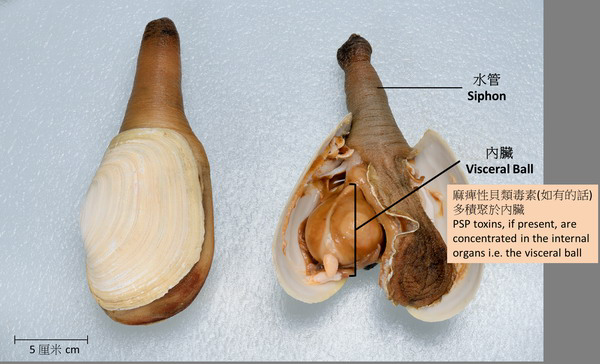
Food Safety Focus (104th Issue, March 2015) – Incident in Focus
Paralytic Shellfish Poisoning (PSP) Toxins in Geoducks
Reported by Mr. Johnny CHU, Scientific Officer,
Risk Assessment Section,
Centre for Food Safety
In December 2014, the Centre for Food Safety (CFS) received notification from Canadian authorities that Paralytic Shellfish Poisoning (PSP) toxins at 1.1 ppm were detected in three consignments of live geoduck from British Columbia (BC). The level exceeded the Canadian standard which is also the action level in Hong Kong (i.e. a maximum level of 0.8 ppm). Besides stopping the sale of the products and banning the import from the same harvest area in BC, the CFS immediately stepped up the import surveillance of geoducks from other parts of Canada. Subsequently, 16 samples of geoduck harvested from other areas of BC were found containing PSP toxins at levels exceeding 0.8 ppm. To protect public health, the CFS immediately informed the Canadian authorities of the test results and extended the import ban on geoducks to the whole BC.
PSP Toxins and their Occurrence in Food
PSP toxins, produced by certain microscopic algae, are a group of related naturally occurring toxins. Shellfish (such as geoducks, mussels, clams, oysters and scallops) filter water through their gills and eat food particles including algae. When the shellfish eat toxins-producing algae, the toxins will be concentrated in tissues of the shellfish, in particular the internal organs. In geoducks, the toxins are mainly found in the viscera ball.

Discard the visceral ball before consumption
It is normal and poses no problems when toxins-producing algae are present in marine water at very low concentrations. However, when the algae "bloom", they become a greater food source for shellfish. The more algae the shellfish eat, the more PSP toxins they accumulate. After the number of toxins-producing algal cells in the water returns to normal low levels, the shellfish gradually flush the toxins from their bodies. However, according to literature, it can be several days to several months or longer before the shellfish are safe for consumption again.
Public Health Significance
PSP toxins are powerful nerve poisons with no known antidote. Early symptoms include tingling of the lips and tongue, which may appear from 30 to 60 minutes after eating the toxic shellfish. Symptoms may progress to loss of control of arms and legs followed by difficulty in breathing. Death can occur in severe cases.
Regulatory Control
The Codex Alimentarius Commission adopts a maximum level of 0.8 ppm for PSP toxins in bivalve shellfish (edible parts). Hong Kong adopts the same level for action.
Preventive Measures
The most effective control measure is the implementation of monitoring programmes in the harvest areas, as currently practised by many developed countries. Government agencies are responsible for monitoring water quality and toxin levels in shellfish in harvest areas. In addition to testing the commercial shellfish products, mussels may be used as sentinel species to monitor the presence of toxins in the harvest areas because mussels concentrate PSP toxins faster than other shellfish. Harvesting will be prohibited when bacteriological or toxin levels of the harvest areas are unsafe.
Toxic shellfish cannot be distinguished from non-toxic ones visually and cooking does not destroy PSP toxins. The public are hence advised to purchase shellfish from reliable retailers, discard all the internal organs of the shellfish before cooking and avoid overindulgence in shellfish consumption.
Key Points to Note
- The most effective control measure is the implementation of monitoring programmes in harvest areas.
- Toxic shellfish cannot be distinguished from non-toxic ones visually and cooking does not destroy PSP toxins.
- PSP toxins, if present, are more likely to accumulate in the internal organs of shellfish.
Advice to the Trade
- Source geoducks from places where monitoring programmes for PSP toxins are established.
- Do not accept geoducks from dubious sources.
Advice to the Public
- Purchase geoducks from reliable sources.
- To reduce the health risk of poisoning by PSP toxins due to consumption of geoducks, remove and discard all internal organs of geoducks before consumption.
- Anyone who feels ill after eating geoducks should immediately seek medical attention.

